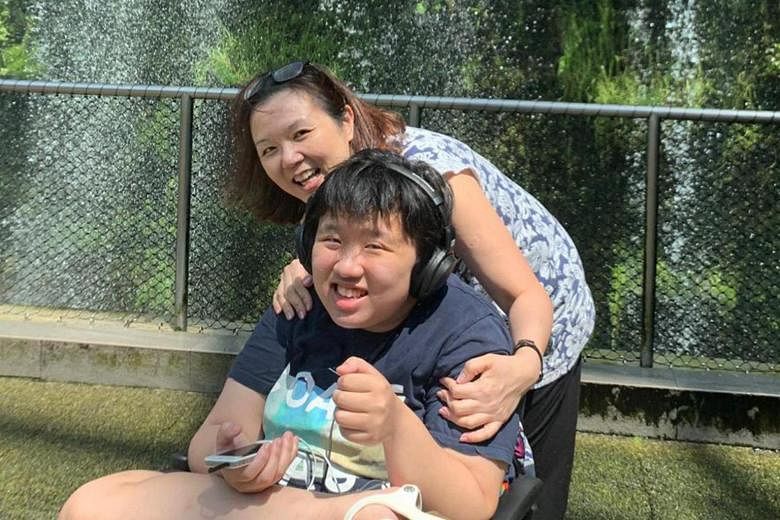SINGAPORE - Amanda Khoo, 18, begs her mother to take her out but refuses to wear a mask when she steps out despite her family's best efforts.
This is not because she lacks social responsibility. Rather, the teenager has severe autism and cannot understand why she needs to stay at home or wear a mask.
Autism, clinically referred to as autism spectrum disorder (ASD), is a lifelong neuro-developmental disorder and is characterised, in varying degrees, by difficulties in social interaction, verbal and non-verbal communication and repetitive behaviour.
The circuit breaker period has taken a toll on Amanda's family as meltdowns have become a daily occurrence. Like many autistic children, Amanda, who is non-verbal, gets frustrated when familiar routines are disrupted. She stomps her feet, screams in frustration and hits her head, including at night.
"Every day I wake up with a heavy heart wondering if it's going to be a more difficult day. But we take it one day at a time," says her mother, who works in education and wants to be known only as Madam Ooi.
She adds: "You can't reason with a severely autistic child."
Before the circuit breaker, the teenager's routine included school and a student care centre for special needs children on weekdays. There were also outings every Sunday to a shopping mall, supermarket or Changi Airport.
Senior psychologist Cindy Kua, who founded mental health therapy centre SkillBuilders, says routine helps to give people with ASD a sense of stability and security.
"Even for adults with typical functioning, staying at home for one month can be challenging; all the more for people with special needs, who tend to have lower tolerance," says Ms Kua, 39, whose special needs clients comprise children and young adults.
She says most of her clients were coping relatively well last month. However, in recent weeks, parents told her their children have become more irritable and are insisting on going back to school.
The return of students to special education schools will be staggered from June 2. All students will be back in school by June 8.
Mrs Florence Choy says her son, Julian, 16, who has moderate autism, misses going to school, working out at the gym and having play dates with his friends.

The 54-year-old business operations director recalls an incident in late April when he put on his uniform and insisted on going to school. She drove him there and he ate lunch during the 20-minute drive, as he usually does.
"I had to slowly drive past the school gates six times to show him the school is closed, and we did a video call with his teachers, who showed him they were at home and reminded him there was no school," says Mrs Choy, who also has a daughter, 13, who attends a mainstream school.
Julian, she adds, has been more frustrated in recent weeks, and sometimes hits other members of the household when he has meltdowns.
Frustration aside, the circuit breaker has also triggered anxiety among some who are autistic.
Mr Sean Bay, 25, who has mild to moderate autism, makes it a point every year to watch the National Day Parade with his friends, who are fellow Pathlight School alumni, either at the parade venue or from a vantage point.

Anxious about how the parade will be scaled down due to the pandemic, Mr Bay, who is a part-time digital animation student at the Institute of Technical Education, expressed his feelings by drawing parade participants donning masks and practising safe distancing.
His mother, content producer Koh Joh Ting, says: "Even though he doesn't participate in it, he watches it religiously every year. It's a huge event in his personal calendar."
CAREGIVER BURNOUT
Dr Koh Hwan Cui, principal psychologist at the KK Women's and Children's Hospital's (KKH) department of child development, says children with developmental needs and their parents have to cope with the new normal of staying home like everyone else.
However, these children may face more difficulty managing anxiety, changes in routines and stress, due to the higher learning, communication, socio-emotional and behavioural needs they may have.
Having to be teacher and therapist to their children during this period of home-based learning can be challenging for some parents as they may also be balancing other work or household responsibilities, says Dr Koh.
When everyone else in the family has gone to bed, Mrs Choy stays up to spend some time alone. She realises she has been sleeping late, sometimes as late as 2am, since the circuit breaker started as there are more responsibilities to tend to during the day.
"When everyone goes to bed, I just want to cling on to the quiet moment. Sometimes, I have the television on and I'm mindlessly watching it. It's important to have that personal space," she says, adding that she also does yoga to unwind.
For Madam Ooi, it is difficult to take a breather by taking Amanda out for even a quick walk in the neighbourhood when her daughter has a meltdown. The teenager yanks off her mask immediately after her mother puts it on.
"Her teachers have put together a nice story about mask-wearing. But Amanda has not worn a mask before and it is tough for her to understand 'why now?'. She doesn't even allow us to put a plaster on her wound," says Madam Ooi.
Dr Koh from KKH says: "Wearing a mask can be difficult for children aged two and older and those with developmental needs. For example, some children with autism or those with sensory issues may find it even more uncomfortable having something covering their mouth and nose."
Second Minister for Education Indranee Rajah said in Parliament on May 5 that children with special needs, accompanied by their parents, also need to go outdoors for some fresh air during the circuit breaker period.
She said children with ASD and attention deficit hyperactivity disorder, in particular, need this for self-regulation, and called on everyone to be more understanding when they see a parent with a special needs child outdoors.
"Sometimes, the children - and they could be adult children - will not be wearing a mask. The Government understands and has stated that enforcement will be flexible for such persons," she said.
FINDING WAYS TO COPE
For some people with special needs, it helps to tap outlets such as the arts and cooking to keep themselves engaged at home.
Mr Bay - whose art has been featured on public transport and merchandise by The Art Faculty, which promotes the works of students with autism - has been honing his artistic skills on various software platforms.
Meanwhile, Ms Magdalene Ong has kept her son Chalmers Wong, 15, who has moderate to severe autism, occupied with cooking and his other hobbies, such as painting, sand art and playing the piano.

She has taught him to prepare more than 10 dishes, such as hor fun (fried flat rice noodles) and chicken wings, since the circuit breaker period started.
"To engage special needs children, you need to enter their world to discover what they like and develop their interests," says Ms Ong, who has also experienced more challenges in caring for her son during this time.
His tantrums in recent weeks involve kicking and screaming, especially when he struggles to understand new concepts introduced in home-based learning.
Ms Ong, 49, who declines to give her occupation, says: "In the first or second week of the circuit breaker, he started screaming in the middle of the night and this went on for at least half an hour."
Chalmers, who was a bowling champion in competitions such as last year's Singapore Sports School Para Games, also misses his favourite activities.

He has written down the places he wants to visit when it is possible to do so again, such as church, Jurong Point and Marina Square.
"He shows the list to me and puts it beside his bed like a teddy bear, although he seems to understand now that he has to stay at home," says Ms Ong.
Despite these struggles, she says one silver lining of the pandemic is that she has learnt new things about Chalmers, such as how he is able to empathise with her. She recalls an incident when, overwhelmed, she screamed and told him she was stressed by his tantrums. This prompted an unexpected reaction from Chalmers.
"He said he doesn't want me to die. He associates stress with death because a few relatives died recently, mostly due to heart attacks. The next day, he did not throw any tantrums and I rewarded him with his favourite KFC meal."












